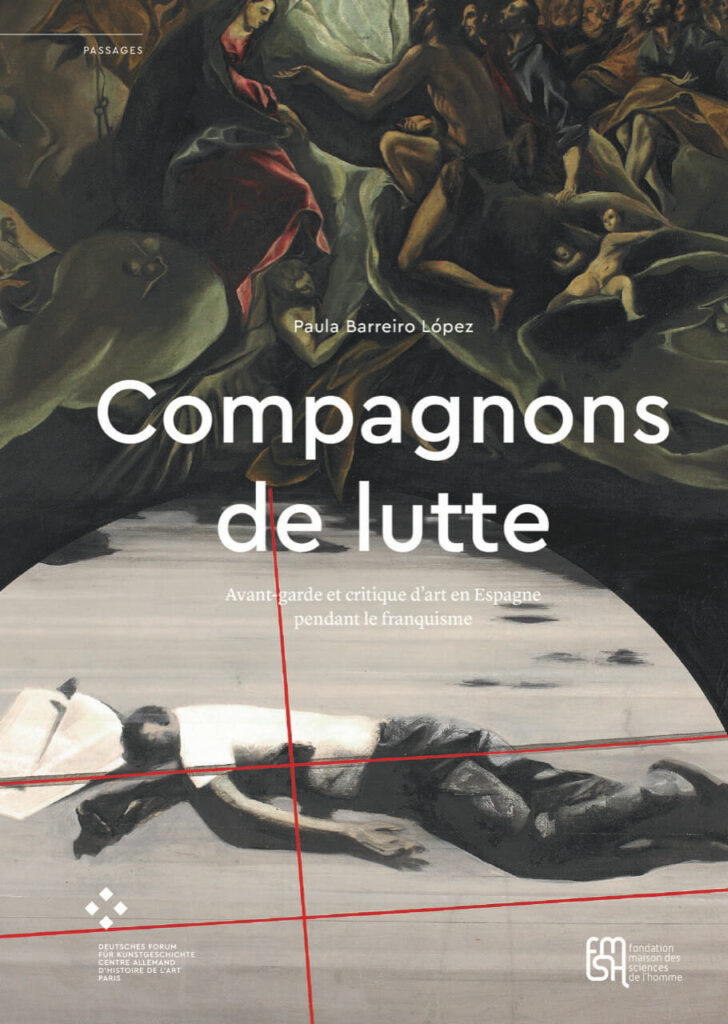Paula Barreiro López, director of the international platform Decentralized Modernities, received the Pierre Daix prize from the Fondation Pinault for her book Compagnons de lutte. Avant-garde and art criticism in Spain during Francoism (Maison des Sciences de l’Homme, 2023).
Created in 2015 as a tribute to writer and art historian Pierre Daix, the prize is awarded each year for a book devoted to the history of modern or contemporary art. Compagnons de lutte draws on previously unexplored archives and previously unpublished interviews to bring aesthetic discourse and practice closer to the socio-political, ethical and cultural context of Franco’s Spain. The book unveils a long-forgotten part of European art historiography, shedding light on the workings of the Spanish avant-garde in the final years of the dictatorship, its dissemination and critical reception in left-wing cultural circles during the Cold War.
Compagnons de lutte was published in French in 2023 (Maison des Sciences de l’Homme). It was first published in English as Avant-garde and Criticism in Francoist Spain (Liverpool University Press 2017), then in Spanish as Vanguardia y crítica de arte en la España de Franco (La Balsa de la Medusa, 2021).
Q: Between aesthetic and ideological debates, how was art perceived in the midst of the Franco period?
A: The perception of art in the midst of Franco’s rule suffered from strong evolutions and transformations in parallel with the dictatorship’s own mutations and contradictions: on the one hand, an extraordinary ability to adapt to the modern world, despite its conservative, even fascist roots; on the other, a sclerotic attitude towards a dissatisfied society that was going to demand more and more freedoms and civil rights. Ever since the configuration of the Junta de Burgos in 1937 as part of Franco’s project to restore the Spanish empire (at least discursively and visually, given the absence of any significant colonial possessions), art and culture played a fundamental role, reinforcing an imaginary link with the past, and disseminating the regime’s conservative ideology: the arts were to glorify and legitimize the state, while remaining completely subordinate to the ideological dictates of this “new empire”. The exaltation of traditionalism was a central element of state-sponsored cultural representations, particularly during the first decade of the dictatorship. Nevertheless, the stabilization of the Franco regime with the bilateral agreements between Spain and the United States in 1953 shifted this understanding towards an aestheticizing vision of the arts (in total syntony with the aesthetic debates of the Cold War Western bloc), which accompanied a policy of international exhibitions of modern art (especially by Spanish informal artists) sponsored by the dictatorship.
Q: In a few words, how would you define the experience of writing this book?
A: The origin and outcome of this book are irrevocably linked to the international itinerancy that defined my own career as a researcher and teacher in different countries and institutions. This journey, during which many conversations with colleagues and ideas shared with my husband across Europe took place, was decisive for the writing of this book. Indeed, Compagnons de lutte was born out of my own experience as a Spanish post-doctoral researcher abroad, in the face of the realization that art and criticism developed in Spain found no space in the hegemonic discourse of modern art, still omnipresent a decade or so ago. From the outset, the book was based on a thesis and fieldwork that involved immersing ourselves in multiple archives in Spain, France, Italy and England, cross-referencing bibliographies (of art history, literature, political history, economics, philosophy…), but also talking and discussing with protagonists who brought the historical analysis to life. In this sense, this book, which draws on art history and cultural history, has launched me on an exciting and wide-ranging cross-disciplinary quest to think about the agentivity of art and culture in the face of totalitarian regimes.
The full interview here

Compagnons de lutte. Avant-garde et critique d’art en Espagne pendant le franquisme
Paula Barreiro López
Paris: MSH Paris, 2023
Download the index
